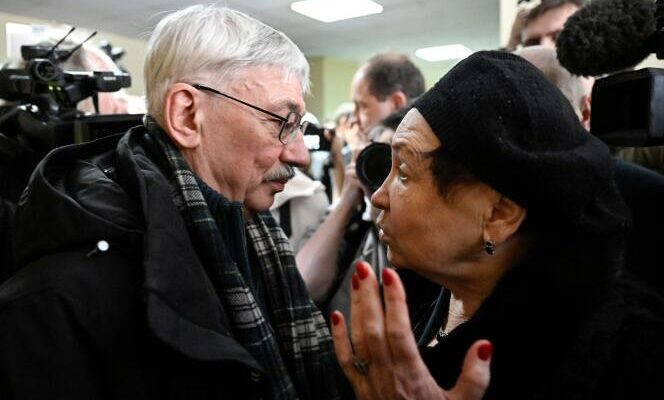Arriving at court as a free man on Tuesday February 27, Oleg Orlov came out handcuffed, supervised by police officers, but still free in his head. Sentenced on appeal to two and a half years in prison for a text entitled: “They wanted fascism and they got it”, the human rights defender had time to say, before being taken away: “This verdict shows that my article is perfectly fair. »
He then walked through the corridors of the Golovinski court to the applause of his supporters, among whom were several ambassadors, including those of France and the European Union. Once outside, the applause was replaced by the barking of police dogs and the sound of the engine of a van ready to head towards the prison.
Oleg Orlov, who in the late 1980s was one of the founders of the memory and human rights organization Memorial, joins the long list of Russian prisoners of conscience, victims of the invasion of Ukraine. At 70 years old, he is in any case the oldest, which undoubtedly explains why those in power, for a time, preferred to take it easy on him.
“Fascism” of Putin’s Russia
At first instance, in October 2023, the former Soviet dissident was sentenced to a simple fine of 150,000 rubles (1,500 euros) for “discrediting the army” – a relatively lenient verdict for his multiple solitary “demonstrations”, simple anti-war signs in hand, and for the publication, on a blog linked to the French site Mediapart and on his Facebook page, of this article denouncing the “fascism” of Putinian Russia.
In the logic of the permanent balance of power which is that of the Russian power, the condemned should have thanked and been forgotten. Oleg Orlov did nothing, announcing his intention to appeal. The prosecution preempted him, even increasing the charges – the human rights defender would have carried out his criminal actions “out of ideological enmity towards patriotic, spiritual and moral values” of Russia and by “hatred against a social group”namely the military.
For this appeal trial, Oleg Orlov radically changed his attitude. At first instance, he had transformed each hearing into a political forum, and made a point of dismantling the elements of the accusation – accumulation of witness statements identical to the comma and expert opinions riddled with errors, plagiarism and even grammar and spelling errors.
You have 42.92% of this article left to read. The rest is reserved for subscribers.
